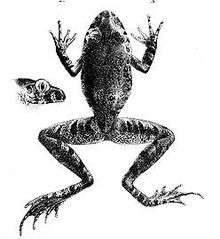Scotobleps
Scotobleps is a monotypic frog genus in the family Arthroleptidae; its sole species is Scotobleps gabonicus,[3] sometimes known as the Gaboon forest frog.[4][5] It is found in eastern Nigeria, western Democratic Republic of the Congo, western and southwestern Cameroon, Equatorial Guinea, and western Gabon. It is also presumed to occur in the western Republic of the Congo[4] and in the Cabinda Enclave of Angola.[1]
| Scotobleps | |
|---|---|
 | |
| Illustration by P.J. Smit from Boulenger's original species description (1900) | |
| Scientific classification | |
| Kingdom: | Animalia |
| Phylum: | Chordata |
| Class: | Amphibia |
| Order: | Anura |
| Family: | Arthroleptidae |
| Genus: | Scotobleps Boulenger, 1900 |
| Species: | S. gabonicus |
| Binomial name | |
| Scotobleps gabonicus | |
| Synonyms | |
|
Astylosternus oxyrhynchus Nieden, 1908 | |
Description
The syntype(s) measured 57 mm (2.2 in) in snout–vent length. The head is rather large, as long as broad. The snout is obtusely pointed with a feeble canthus rostralis. The eyes are large. The fingers and toes are moderately elongated, with slightly swollen tips and very strong subarticular tubercles. The toes are half-webbed. Skin is smooth or with small flat warts on the back. The dorsum is olive-brown with small, blackish spots. There is a dark cross-band between the eyes and the upper lip has blackish vertical bars; the one below the anterior third of the eye is extending onto the lower lip. Limbs have dark cross-bars. The venter is white.[2][5]
Habitat and conservation
Scotobleps gabonicus is a common species at low altitudes, living in lowland rainforests, including secondary forests. Breeding takes place in flowing water, preferably in wide, shallow streams with sandy banks but also in torrents. Loss of its forest habitat is causing population declines.[1]
_(7706535264).jpg)
References
- Amiet, J.-L.; Burger, M.; Largen, M. (2004). "Scotobleps gabonicus". IUCN Red List of Threatened Species. 2004: e.T54442A11146142. doi:10.2305/IUCN.UK.2004.RLTS.T54442A11146142.en.
- Boulenger, G. A. (1900). "A list of the batrachians and reptiles of the Gaboon (French Congo), with descriptions of new genera and species". Proceedings of the Zoological Society of London. 1900: 433–456.
- Frost, Darrel R. (2016). "Scotobleps Boulenger, 1900". Amphibian Species of the World: an Online Reference. Version 6.0. American Museum of Natural History. Retrieved 23 January 2016.
- Frost, Darrel R. (2016). "Scotobleps gabonicus Boulenger, 1900". Amphibian Species of the World: an Online Reference. Version 6.0. American Museum of Natural History. Retrieved 23 January 2016.
- Zimkus, B. "Scotobleps gabonicus Boulenger, 1900". African Amphibians. Retrieved 23 January 2016.
